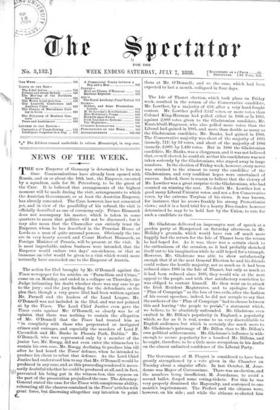The Isle of Thanet election, which took place on Friday
week, resulted in the return of the Conservative candidate, Mr. Lowther, by a majority of 658, after a very hard-fought contest. Mr. Lowther polled 3,547 votes, or more votes than Colonel King-Harman had polled either in 1886 or in 1885, against 2,889 votes given to the Gladstonian candidate, Mr. Knatchbull-Hugessen, who also polled more votes than the Liberal had gained in 1885, and more than double as many as the Gladstonian candidate, Mr. Banks, had gained in 1886. The Conservative majority was short of the majority of 1885 (namely, 711) by 53 votes, and short of the majority of 1886 (namely, 2,088) by 1,430 votes. But in 1886 the Gladstonian candidate, Mr. Banks, was a clergyman, and it was not believed that, even if elected, he could sit, so that his candidature was not taken seriously by the Gladstonians, who stayed away in large numbers. In the election of Friday week, howeve7. every nerve was strained to the utmost to carry the candi&te of the Gladstonians, and very confident hopes were entertained of success. Indeed, there is reason to believe that the victory of Mr. Lowther was a great surprise to the Gladstonians, who had counted on winning the seat. No doubt Mr. Lowther lost a good many Liberal Unionist votes, and not a few Conservative votes, by the extreme Toryism of his views. It was known, for instance, that he avows frankly his strong Protectionist views ; and it is a hard trial for a hearty Free-trader, however determined he may be to hold fast by the Union, to vote for such a candidate as that.


































